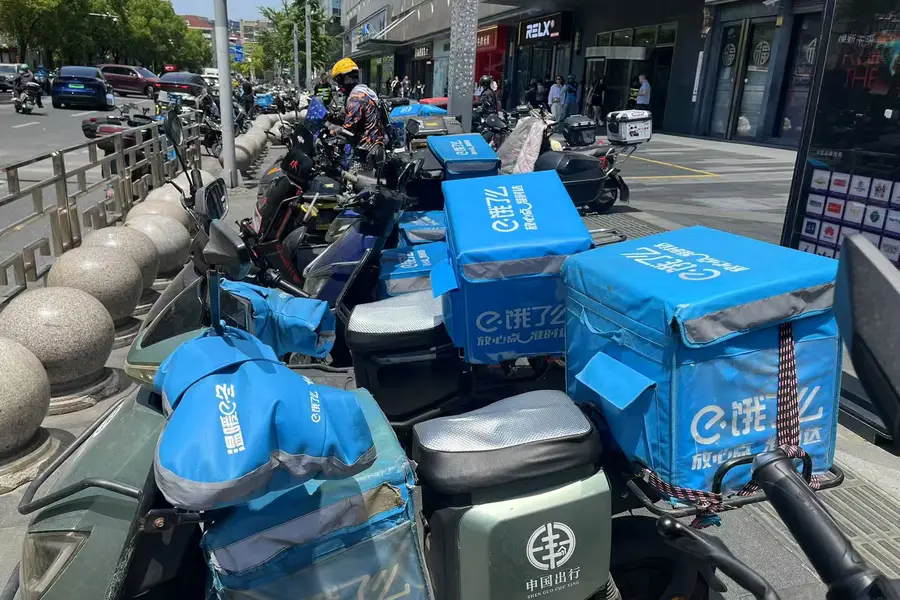Quhuo’s transformation story hits headwinds as new initiatives stumble

The company is moving away from its original business of providing takeout dining drivers, but revenue for most of its major new initiatives contracted in the second half of 2024
Key Takeaways:
- Quhuo’s revenue fell 27% in the second half of last year, as its core on-demand delivery services fell by 25%
- The company’s car exporting business also suffered a setback during the six-month period, as its vehicle exports fell sharply following a strong start in 2023
By Doug Young
To call Quhuo Ltd. (QH.US) a company in transition seems like understatement of the year, based on its latest results for the second half of 2024 issued last week. Quhuo got its start by providing many of the thousands of takeout dining drivers who delivered meals for operators like Meituan and Ele.me.
The company has been moving away from that low-margin business these days, probably at least partly as Meituan, Ele.me and new entrant JD.com get pressured to provide better benefits to their drivers. It’s looking to redeploy many of its drivers into deliverers of groceries and other goods, as reflected by its launch of a new partnership with beef provider Niu World last year.
But that’s not all that Quhuo is doing. The company has also entered the homestay business, which appears to be the major force behind a doubling in its stock last September. It’s also getting into new energy vehicle (NEV) exports, and ride hailing services, as well as providing housekeeping services.
While some of those new initiatives showed some promising results in the first half of last year, they appear to have lost much of that momentum in the second half, though it’s hard to tell based on the way the company selectively gives out data. That’s not hugely surprising, given that many of the new areas Quhuo is entering are already very competitive, combined with weakening consumer demand in a slowing Chinese economy.
As a result of those factors, none of the new initiatives have really amounted to much just yet, with Quhuo’s core on-demand food delivery business still accounting for 93% of its revenue in the second half of last year. In its latest results, the company said “2024 marked a year of strategic transformation for Quhuo.”
“In 2024, we focused on stabilizing our cash-generating businesses while scaling innovative ventures, achieving steady operations and notable improvements in key business lines,” said founder and Chairman Leslie Yu.
Among its many new initiatives, the NEV export business looks the most intriguing, though it appears to have stalled a bit last year, no doubt due to the complexity of exporting used cars. The homestay business could also have some potential under a new platform the company rolled out last September, which lit a fire under Quhuo’s stock, causing it to more than double in just a matter of days.
Still, the company’s stock has lost more than 98% of its value since its 2020 IPO, during headier times when it wowed investors with its position as a key supplier of drivers to China’s booming takeout dining industry.
That business continued to be Quhuo’s bread-and-butter in the second half of last year, supplying 1.33 billion yuan ($183 million) out of the company’s total of 1.43 billion yuan for the six-month period, according to the latest results. Unfortunately for Quhuo, both its overall and on-demand driver revenue were down sharply in the six-month period, the former by 27% and the latter by 25%. The company blamed the drop on its disposal of several underperforming service stations.
‘Repurposing’ delivery infrastructure
Quhuo said it is in the process of “repurposing its delivery infrastructure for higher-value use … marking a shift from fulfillment service provider to supply chain enabler.” That refers to the shift that we previously mentioned, away from providing drivers to takeout dining services to using its fleet to deliver products for other third parties.
So far, Niu World looks like the major new partner under the shift, though the company didn’t give out any data on how much revenue that partnership actually brought in. “Following a successful pilot, the model is expected to drive revenue growth in 2025, paving a new path for expansion in Quhuo’s food delivery business,” the company said. “Future plans include expanding this model to other highly perishable food segments.”
Meantime, revenue from the company’s mobility services segment, a distant second in terms of contributors after on-demand delivery services, tumbled 57% in the second half of the year to 74.7 million yuan from 175 million yuan a year earlier. The company blamed the drop on a falling revenue from its vehicle export business, in a setback for that young initiative.
Quhuo launched the vehicle export business in 2023 and previously said it had exported 13,000 vehicles to markets like the Middle East and South America by the end of 2023, with 9,836 vehicles successfully delivered. But in its latest report, the company said it had shipped just 3,500 vehicles overseas by the end of 2024, which appears to refer to its exports for last year.
Such a big drop is disappointing but not too unexpected, as the big figure for 2023 exports was probably due to one-time business involving one or two major buyers with the initiative’s launch. After that initial burst, Quhuo is now trying to create a more sustainable business by building up the necessary infrastructure to handle things like car inspections, reconditioning, exports and customs clearing in destination countries.
The company has set up reconditioning bases in the cities of Chengdu and Guangzhou, and launched a platform called Carnuxt to handle the business. This initiative could hold out big potential if Quhuo can build up the necessary infrastructure, since China is currently the world’s biggest NEV market and many of those vehicles will start entering the used car market in the years ahead.
Then there’s the homestay business, which Quhuo operates using a company it acquired called Chengtu. While that service was initially more generally focused, similar to Airbnb, Quhuo last year announced an initiative to turn it into a more segmented service focused on six key areas: care, e-sports, business travel, family, cinema and elegant retreat. That approach that targets specific types of travelers may also hold potential at some point. But revenue from the company’s housekeeping and accommodation services division, which includes the homestay business, also fell 17% in the second half of last year to 22.9 million yuan from 27.5 million yuan a year earlier – hardly encouraging for a new area.
Quhuo managed to stay profitable during the second half of last year, with its net income rising to 48.1 million yuan from 11.7 million yuan a year earlier. But it had just 65 million yuan in cash at the end of last year, far less than its short-term debt totaling 113 million yuan. Investors weren’t too excited about the latest report, with Quhuo’s stock falling 7% in the three trading days after the announcement. At the end of the day, the company will need to show better progress on some of its many new initiatives to draw pique investor interest again.
To subscribe to Bamboo Works weekly free newsletter, click here




